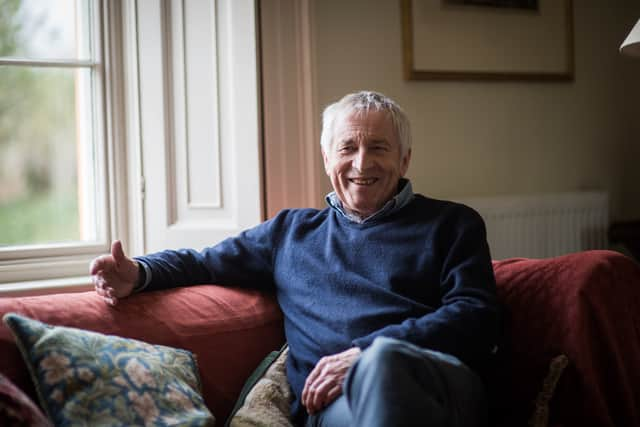‘Gentrification not the problem’ - Jonathan Dimbley talks about living in Bristol


I first came to Bristol to work on Points West and for Radio Bristol. I lived in Bath, we rented a big house and shared it with students. My then wife started as a teacher in Brislington and I worked at Whiteladies Road. I had a three-month contract, it was £20 a week, I remember that much. They then asked if I wanted to work as a freelance, and I did, and my earnings leapt to £80 a week. I stayed there and the Bath Blues Festival happened [when live reports he sent through to the BBC were used for the World at One] and I went to work in London.
Bristol was very different, it was much less exciting than it now is now, and, much less developed. It had its famous Old Vic theatre of course but all around the floating harbour and the docks was really nothing. The remains of docks were still there - it was very dreary and run-down that part of the city, but there was still posh Clifton as it were. There was racial tension between the police and the young black community in St Pauls and I quite often found myself reporting from there. There were clubs where the police would arrive, in my view, slightly mob-handed and it was a frequent battleground between the police and the very distrusting young black community.
Advertisement
Hide AdAdvertisement
Hide AdWhen I came back to Bristol to live, I was looking at a new city really. We were living in Devon, in the country, five years ago, my children were seven and nine, and my wife Jessica was driving 200 miles a week just to get them to the local primary school, dancing, swimming etc. So we decided we better try living in the city. Jessica, who wanted to broaden her teaching horizons and loves cities, was immediately at home. I am a countryman at heart so it was a big adjustment. However, we were very lucky we got this very nice house in a lovely part of the city [Hotwells] and I came to love the city to live in.
I love the fact you can walk everywhere. My regular walk is around the floating harbour. I try to walk everyday and - courtesy of lockdown - I discovered the delights of Leigh Woods and Ashton Court. I also like walking the streets, but I’m still very in the west of the city, I don’t really know the south of the city at all. The furthest south I go is the Tobacco Factory [Bedminster]. But I walk to the station, walk to theatre, walk to restaurants. It is a very walkable city.


It is a lovely city. I very rarely have a coffee, I tend to go out, walk to do my exercise, look around, see what’s happening, feel better for it and go back to my desk. It has some fine buildings and I like the fact that it is rich in its culture, but it is in contention with itself and of course there is tension in the city and some of it is half-ignored. There are great economic gulfs and I think balancing all the interests in the city is a challenge for whoever is seeking to run it.
I think gentrification is not the essentially problem. We need more houses. The question is how to ensure we ease the pressure on people on who have poor housing. Gentrification is inevitable because all people want to improve their homes. Prices go up. Someone who inherits a house is bound to say at some point ‘we are going to cash in on this’ and it gets snapped up by someone who has the funds to buy it. It is a very big social and economic challenge to which there are no pat answers. You are balancing all the time, how do you preserve the integrity and attraction of an area with a need to build houses?
Advertisement
Hide AdAdvertisement
Hide AdI was at the first Cifton LitFest talking about my previous book. I’m not reticent about what I’ve done and I want people to share my engagement. If you are a reporter, you don’t report to yourself, you report to other people. Not everyone is going to buy the book, but you want them to know what you think you have discovered that you think they might be interested in. So I like to share it. Writers are different. Some writers can’t bear the thought of going to literary festivals, others absolutely love it. I absolutely love it, no I don’t absolutely love it. You have to psych yourself up to talk about something publicly, you don’t just breeze in, so it’s testing. Literary festivals, in general, I think are fantastic. It is one of the great achievement over the past 10 years or so - the increase in demand for people to hear and talk about books across a great range - from thrillers to cookery to history to poetry. It is a wonderful thing.
Barbarossa: How Hitler Lost the War is the story of Hitler invasion of the Soviet Union in June 1941 with the largest invaded military force in the history of the world. 3.3 million men on a front that extended for 1,000 miles. The speed of the Blitzkreig meant they advanced very fast. Everyone thought it was going to break the Soviet Union in weeks. What I’ve tried to do is to explain why they were so wrong and why by the end of the year Hitler had effectively lost the war, even though the killing went on for another three and half years.
I’m now working on the successor which is due to be published in 2024. It is the year in which Stalin’s armies broke the back of Hitler’s forces, as a result he was able to call the shots in Europe. The Western Allies played a crucial role securing Western Europe for freedom and democracy. Otherwise the continent would have been in Soviet hands or enthral to an alliance between Moscow and Berlin. But it was on the Eastern Front that Hitler was beaten.
Jonathan Dimbleby was interviewed ahead of appearing at the Clifton LitFest to talk about his book, Barbarossa: How Hitler Lost the War on Saturday afternoon.
Comment Guidelines
National World encourages reader discussion on our stories. User feedback, insights and back-and-forth exchanges add a rich layer of context to reporting. Please review our Community Guidelines before commenting.
